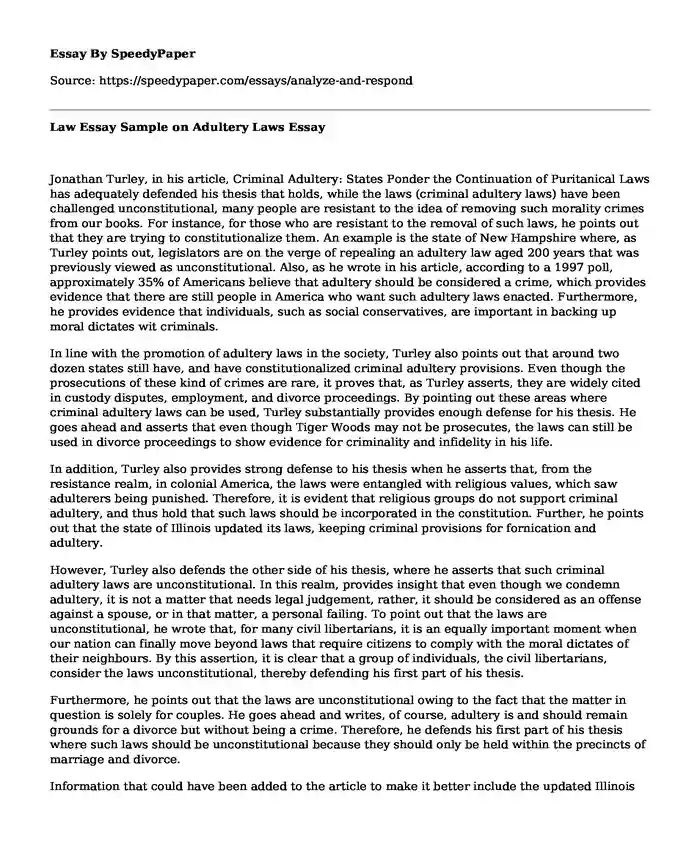Jonathan Turley, in his article, Criminal Adultery: States Ponder the Continuation of Puritanical Laws has adequately defended his thesis that holds, while the laws (criminal adultery laws) have been challenged unconstitutional, many people are resistant to the idea of removing such morality crimes from our books. For instance, for those who are resistant to the removal of such laws, he points out that they are trying to constitutionalize them. An example is the state of New Hampshire where, as Turley points out, legislators are on the verge of repealing an adultery law aged 200 years that was previously viewed as unconstitutional. Also, as he wrote in his article, according to a 1997 poll, approximately 35% of Americans believe that adultery should be considered a crime, which provides evidence that there are still people in America who want such adultery laws enacted. Furthermore, he provides evidence that individuals, such as social conservatives, are important in backing up moral dictates wit criminals.
In line with the promotion of adultery laws in the society, Turley also points out that around two dozen states still have, and have constitutionalized criminal adultery provisions. Even though the prosecutions of these kind of crimes are rare, it proves that, as Turley asserts, they are widely cited in custody disputes, employment, and divorce proceedings. By pointing out these areas where criminal adultery laws can be used, Turley substantially provides enough defense for his thesis. He goes ahead and asserts that even though Tiger Woods may not be prosecutes, the laws can still be used in divorce proceedings to show evidence for criminality and infidelity in his life.
In addition, Turley also provides strong defense to his thesis when he asserts that, from the resistance realm, in colonial America, the laws were entangled with religious values, which saw adulterers being punished. Therefore, it is evident that religious groups do not support criminal adultery, and thus hold that such laws should be incorporated in the constitution. Further, he points out that the state of Illinois updated its laws, keeping criminal provisions for fornication and adultery.
However, Turley also defends the other side of his thesis, where he asserts that such criminal adultery laws are unconstitutional. In this realm, provides insight that even though we condemn adultery, it is not a matter that needs legal judgement, rather, it should be considered as an offense against a spouse, or in that matter, a personal failing. To point out that the laws are unconstitutional, he wrote that, for many civil libertarians, it is an equally important moment when our nation can finally move beyond laws that require citizens to comply with the moral dictates of their neighbours. By this assertion, it is clear that a group of individuals, the civil libertarians, consider the laws unconstitutional, thereby defending his first part of his thesis.
Furthermore, he points out that the laws are unconstitutional owing to the fact that the matter in question is solely for couples. He goes ahead and writes, of course, adultery is and should remain grounds for a divorce but without being a crime. Therefore, he defends his first part of his thesis where such laws should be unconstitutional because they should only be held within the precincts of marriage and divorce.
Information that could have been added to the article to make it better include the updated Illinois laws that provide proof that criminal adultery laws ad been incorporated in the constitution. By providing this piece of information, it would have strengthened the evidence some states are constitutionalizing the laws. However, I feel that he fully defended his thesis.
Reference
Turley, J. (2010). Criminal Adultery: States Ponder the Continuation of Puritanical Laws. USA Today.
Cite this page
Law Essay Sample on Adultery Laws. (2019, Jul 18). Retrieved from https://speedypaper.net/essays/analyze-and-respond
Request Removal
If you are the original author of this essay and no longer wish to have it published on the SpeedyPaper website, please click below to request its removal:
- Ain't I a Woman - Free Essay with a Speech Analysis
- Benefits of Business Incubators
- Article Review Essay Sample: Wilderness Conservation and the Reach of the State
- Free Essay Example: The 1970s in America's History
- Essay Sample on Napoleon Bonaparte and the Humanities
- Paper Example on Cash Flow Sensitivity as a Measure of Financial Constrain
- Essay Example - Why Music Can Be Considered a Language
Popular categories





